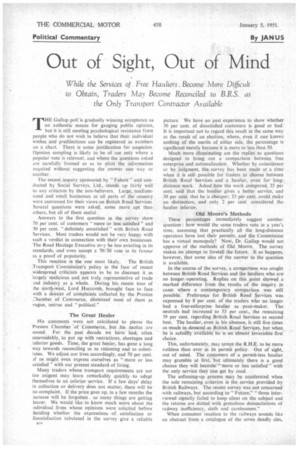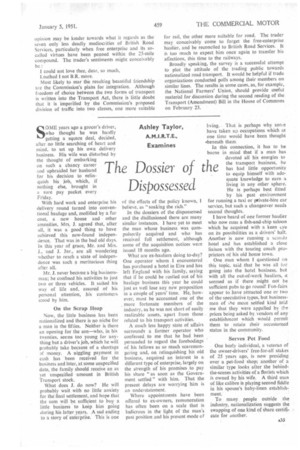Out of Sight, Out of Mind
Page 50

Page 53

If you've noticed an error in this article please click here to report it so we can fix it.
While the Services of Free Hauliers. Become More Difficuk to Obtain, Traders May Become Reconciled to B.R.S. as the Only Transport Contractor Available HE Gallup poll is gradually winning acceptance as an authentic means for gauging public opinion, but it is still meeting psychological resistance from people who do not wish to believe that their individual wishes and predilections can be registered as numbers on a chart. There is some justification for suspicion. Opinion sampling is likely to be of use only where a popular vote is relevant, and where the questions asked are carefully framed so as to elicit the information required without suggesting the answer one way or another.
The recent inquiry sponsored by " Future " and conducted by Social Surveys, Ltd., stands up fairly well to any criticism by the non-believers. Large, mediumsized and small businesses in all parts of the country were canvassed for their views on British Road Services Several questions were asked, some more apt than others, but all of them useful.
Answers to the first question in the survey show 70 per cent. of customers more or less satisfied" and 30 per cent. "definitely unsatisfied" with British Road Services. Most traders would not be very happy with such a verdict in connection with their own businesses. The Road Haulage Executive rirly be less exacting in its standards, and even accept a 70/30 vote in its favour as a proof of popularity.
This reaction is the one most likely. The British Transport Commission's policy in the face of recent 'widespread criticism appears to be to discount it as largely malicious and, not truly, representative of trade Ind induStrY as A whole. During his recent tour of the nOrth-wes-t, Lord Hurcomb, brought face to face with a dossier of complaints collected by the Preston L'hamber of Commerce, dismissed most of them as vague, untrue and "political."
The Great Healer His comments •were not calculated to please the Preston Chamber of Commerce, but his tactics are sound. For the past decade we have had, often unavoidably, to put up with restrictions, shortages and inferior goods. Time, the great healer, has gone a long way towards reconciling us to rationing and to substitutes. We adjust our lives accordingly, and 70 per cent. )1. us might even express ourselves as "more or less satisfied" with our present standard of living.
Many traders whose transport requirements are not too exigent may learn remarkably quickly to adapt themselves to an inferior service. If a few days' delay in collection or delivery does not matter, there will be no complaint. If the price goes up, in a few months the ncrease will be forgotten so many things are getting iearer. We would like to know much more about the ndividual firms whose opinions were solicited before Jeciding whether the expressions. of satisfaction or lissatisfaction tabulated in the survey give a reliable picture. We have no past experience to show whether 30 per cent. of dissatisfied customers is good or bad. It is important not to regard this result in the same way as the result of an election, where, even if one knows nothing of the merits of either side, the percentage is significant merely because it is more or less than 50.
Much more illuminating are the replies to questions designed to bring out a. comparison between free enterprise and nationalization. Whether by coincidence or by judgment, the, survey has been made at a time when it is still possible for traders to choose between British Road Services and a haulier, even for longdistance work. Asked how the work compared, 35 per cent. said that the haulier gives a better service, and 30 per cent. that he is cheaper; 33 per cent, could make no distinction, and only 2 per cent. considered the haulier inferior.
Old Moore's Methods
These percentages immediately suggest another question : how would the same traders vote in a year's time, assuming that practically all the long-distance operators have lost their permits, and the Commission has a virtual monopoly? NoW, Dr. Gallup would not approve of the methods of Old Moore. The survey makes no attempt to foretell the future. It so happens, however, that some idea of the answer to the question is available.
In the course of the survey, a comparison was sought between British Road Services and the hauliers who are no longer operating. Replies on this point showed a marked difference from the results of the inquiry in cases where a contemporary comparison was still possible. Preference for British Road Services was expressed by 8 per cent. of the traders who no longer had a free-enferprise haulier as pace-maker. The neutrals had increased to 53 per cent., the remaining 39 per cent. regarding British Road Services as second best. The haulier, even in his absence, is still five times as much in demand-as British Road Services, but when he is actudIty available he is an almost invariable first choice.
This, unfortunately, may tempt the R.H.E. to be more ruthless than ever in its permit policy. Out of sight, out of mind. The customers of a permit-less haulier may grumble at first, but ultimately there is a good chance they will become' more or less satisfied" with the only service they can get by road.
The softening-up process may be accelerated when the sole remaining criterion is the service provided by British Railways. The recent survey was not concerned with railways, but according to "Future," "those interviewed signally failed to keep silent on the subject and the returns are dotted with gratuitous denunciations of railway inefficiency, sloth and carelessness."
When consumer reaction to the railways sounds like an abstract from a catalogue of the seven deadly sins, opinion may be kinder towards what it regards as the seven only less deadly mediocrities of British Road Services, particularly when free enterprise and its socalled virtues have been penned within the 25-mile compound. The trader's sentiments might conceivably be I could not love thee, dear, so much, Loathed I not B.R. more.
Most likely to mar the resulting beautiful friendship are the Commission's plans for integration. Although freedom of choice between the two forms of transport is written into the Transport Act, there is little doubt that it is imperilled by the Commission's proposed division of traffic into two classes, one more suitable for rail, the other more suitable for road. The trader may conceivably come to forget the free-enterprise haulier, and be reconciled to British Road Services. It is too much to expect him once again to transfer his affections, this time to the railways.
Broadly speaking, the survey is a successful attempt to plot the attitude of the trading public towards nationalized road transport. It would be helpful if trade organizations conducted polls among their members on similar lines. The results in some cases, as, for example, the National Farmers' Union, should provide useful material for discussion during the second reading of the Transport (Amendment) Bill in the House of Commons on February 23.




















































































